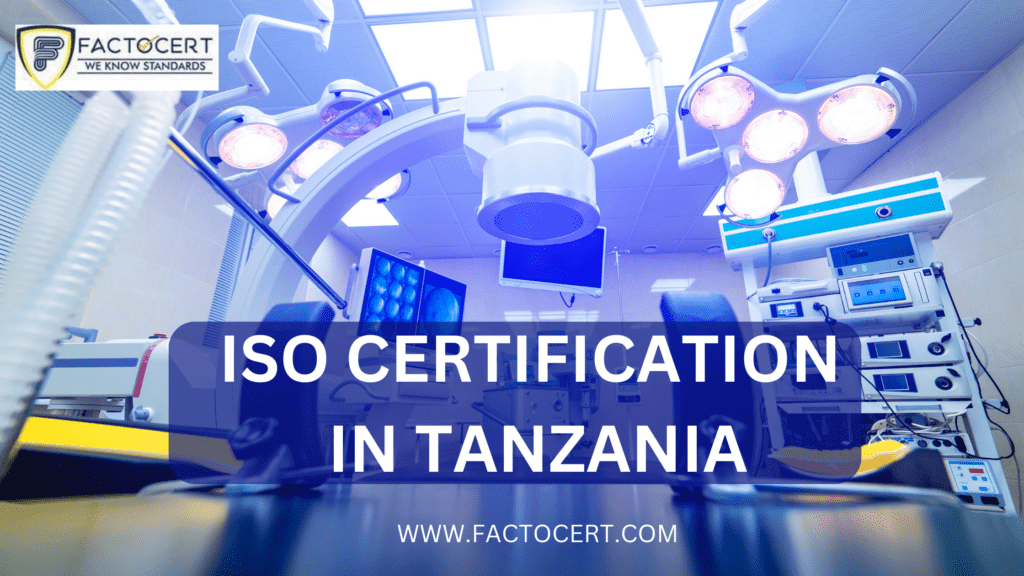ISO Certification in Tanzania for medical equipment requires adherence to strict quality and safety requirements. It checks that manufacturers follow established processes, risk management, and biocompatibility evaluations, ensuring that medical devices are safe, effective, and satisfy regulatory standards for patient health and worldwide market access.
Obtaining ISO certification in Tanzania is significant for medical device makers in Tanzania for various reasons:
- Quality Assurance: ISO Certification in Tanzania, specifically ISO 13485 (Medical Devices — Quality Management Systems), helps ensure that medical device manufacturers maintain consistent and high-quality production processes. This is vital for assuring the safety and efficacy of medical equipment, which can directly influence patient health.
- Regulatory Compliance: ISO standards are commonly associated with regulatory needs in various nations. In Tanzania, like in many other countries, regulatory agencies may mandate or promote ISO certification in Tanzania as part of the clearance procedure for medical equipment. Complying with ISO standards can ease regulatory clearances and market access.
- Market Access: ISO Certification is recognized internationally. Having ISO certification will make it simpler for Tanzanian medical device makers to reach worldwide markets and compete on a global basis. It indicates a dedication to quality and safety, which is typically a criterion for accessing overseas markets.
- Customer trust: Medical items created in Tanzania that have earned the ISO certification in Tanzania of their quality and safety are more likely to be purchased. Healthcare professionals and end-users are more inclined to trust and pick items that have been certified to international standards.
- Operational Efficiency: Implementing ISO standards can lead to enhanced operational efficiency, less waste, and better resource use. This might result in cost savings and increased competitiveness in the market.
What ISO Certification Can be Applied for Medical Devices in Tanzania?
ISO 13485 Certification in Tanzania This standard outlines the standards for a quality management system (QMS) relevant to medical devices. It includes the whole product lifespan, from design and development to manufacture, installation, and service.
The ISO certification in Tanzania process for medical devices entails an organized route to verify that a manufacturer’s quality management system (QMS) fulfills the rigorous criteria requirements as set out by ISO (International Organisation for Standardisation).
Here’s a quick description of the essential processes in this process:
- Preparation: Understand the relevant ISO standards, notably ISO 13485, and examine your organization’s current QMS against these criteria. Ensure that high management is dedicated to the certification process.
- Paperwork: Develop a Quality Manual and the essential paperwork, including procedures, work instructions, and forms, to support your QMS. These papers will provide the basis for regulation enforcement.
- Training: Provide training to your employees to ensure they grasp the ISO standards, QMS requirements, and their roles in maintaining quality and compliance.
- Risk Management: Implement a strong risk management approach as per ISO 14971 to identify, analyze, and reduce risks connected with your medical devices.
- Process Improvement: Review and upgrade existing procedures to match them with ISO certification in Tanzania. Ensure uniform documentation and execution.
- Supplier Management: Establish methods for reviewing and monitoring suppliers to ensure they satisfy quality and regulatory criteria.
- Internal Audits: Conduct frequent internal audits to examine the efficacy of your QMS and suggest areas for improvement. Correct any non-conformities detected during audits.
- Management Review: Schedule and hold management reviews to analyze the overall performance of your QMS and make strategic decisions based on the results.
- Documentation and Records: Maintain accurate records of all quality-related actions and procedures, making that documentation is accessible and up to date.
- Certification Body: Choose a recognized certification body skilled in ISO 13485 certification for medical equipment. Work with them to plan external audits.
- External Audits: Undergo external audits conducted by the certification authority to examine your QMS against ISO standards. Address any findings or non-conformities uncovered during the audit.
- Continuous Improvement: Continuously monitor and assess the efficacy of your QMS, performing corrective and preventative measures as appropriate to increase performance.
- Maintain Compliance: After receiving ISO certification in Tanzania, continue to maintain and develop your QMS to guarantee continued compliance with ISO requirements.
Why select Factocert for ISO Certification in Tanzania?
Factocert is the Best ISO Consultant in Tanzania. We give the finest ISO Consultant service in Dar es Salaam, Mwanza, Dodoma, Mbeya, Moshi, Morogoro, and other major cities of Tanzania with the service of implementation, training, auditing, and registration. ISO 27001, ISO 9001, ISO 14001, ISO 13485, ISO 22000, ISO 17025, ISO 45001, and many more are just some of the standards we provide.
Choosing Factocert gives various advantages. Their certification assures confidence and recognition internationally. With a team of specialist auditors, they possess an in-depth understanding of ISO standards and the Tanzanian business scene, providing precise and industry-relevant evaluations. Factocert promotes client service, supporting enterprises through the certification process efficiently.
Conclusion:
Tanzanian medical device makers must be educated on the unique regulatory requirements and standards related to their goods and markets. Engaging with appropriate regulatory authorities and obtaining direction from certification bodies may help guarantee that they satisfy all applicable compliance and certification standards. Obtaining ISO certification in Tanzania helps boost the reputation, marketability, and competitiveness of medical equipment made in Tanzania, both domestically and globally.
For more information visit: ISO Certification in Tanzania





